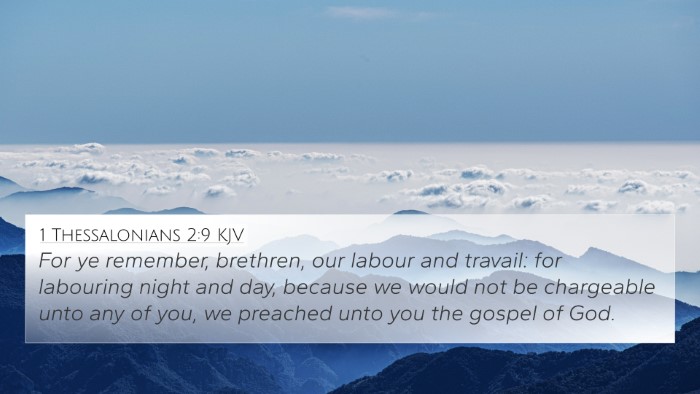Understanding 1 Corinthians 9:4
Bible Verse: 1 Corinthians 9:4
This verse poses an intriguing question regarding the rights of apostolic ministers. Paul asserts that he and Barnabas, being apostles, have the right to receive sustenance and support from the communities they serve.
Exegesis and Context
1 Corinthians 9:4 reads:
"Do we not have the right to eat and drink?"
In this passage, the Apostle Paul is defending his authority and rights as a minister of the Gospel. He uses rhetorical questions to emphasize the legitimacy of his concerns and the rights inherent to all apostles.
Summary of Commentaries
- Matthew Henry: Henry emphasizes the principle that ministers should be supported by their congregations. He suggests that physical needs, like food and drink, reflect the spiritual nourishment provided by preaching.
- Albert Barnes: Barnes highlights that this question signifies a broader discussion on the entitlements of ministers against the backdrop of their calling. He notes that just as laborers deserve their wages, so too do spiritual workers deserve material support.
- Adam Clarke: Clarke indicates that Paul is addressing potential complaints about investing resources into spiritual leaders. He argues the practicality of supporting one's ministerial leaders to maintain a healthy, functioning church.
Thematic Connections and Cross-References
Understanding the rights and support of ministry leads us to several key thematic connections across Scripture:
- Galatians 6:6: "Let the one who is taught the word share all good things with the one who teaches." This emphasizes the importance of not only receiving teaching but also providing for the teacher.
- 1 Timothy 5:17-18: "Let the elders who rule well be considered worthy of double honor, especially those who labor in preaching and teaching." This highlights the value placed on the work of ministry.
- Luke 10:7: "And remain in the same house, eating and drinking what they provide, for the laborer deserves his wages." A direct affirmation of the rights of those who work in ministry.
- Matthew 10:10: "Nor bag for your journey, nor two tunics, nor sandals, nor staff, for the laborer deserves his food." This quote from Jesus supports the idea of ministers being supported through their congregations.
- Philippians 4:15-16: Paul recounts how the Philippian church supported him financially, implying that such partnerships are essential for effective ministry.
- Mark 6:10: Jesus speaks about the worthiness of a worker, hinting at the ministry being a profession deserving of sustenance.
- 1 Peter 5:2: "Shepherd the flock of God that is among you, exercising oversight, not under compulsion, but willingly..." emphasizes the guidance of spiritual leaders and the importance of their care.
- 2 Corinthians 11:8-9: Paul discusses support received from other churches, reinforcing the interdependence in ministry.
- Romans 15:27: "For if the Gentiles have come to share in their spiritual blessings, they ought also to be of service to them in material blessings." In forms of mutual support.
- Acts 18:3: Paul’s trade as a tentmaker illustrates the mixed mode of support, where he funded his ministry through secular work while also relying on the gifts of others.
Inter-Biblical Dialogue
The concept of ministers being supported is not limited to the Pauline epistles but finds its roots throughout scripture:
- Examining Old Testament Levitical Laws, we recognize that the Levites were given certain rights to the offerings made by the people.
- In the Gospels, discussions surrounding ministry sustenance appear frequently in Jesus' teachings about laborers in the vineyard and their worthiness.
- The book of Hebrews recounts the traditions of priesthood, further linking the theme of support towards spiritual leaders and illustrating continuity with the new covenant.
Practical Application
Understanding 1 Corinthians 9:4 encourages congregations to recognize the spiritual sacrifices of their leaders. It is essential for believers to appreciate and support the ministry, ensuring that spiritual leaders can focus on their calling without the burdens of poverty or lack.
Conclusion
This analysis of 1 Corinthians 9:4, with insights from esteemed commentaries, reinforces the value and rights of those laboring in ministry. Recognizing that the sustenance of spiritual leaders is a biblical principle can enrich church communities and foster supportive relationships between congregations and their ministers.










